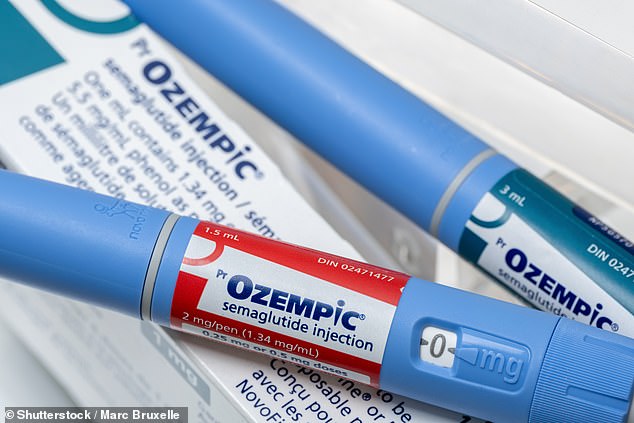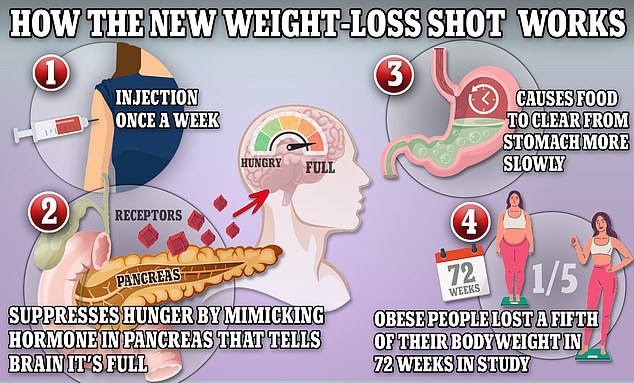UK health chiefs deliver shocking verdict on Ozempic link to suicidal thoughts
Weight-loss blockbusters do not raise the risk of suicidal thoughts and self-harm, health authorities have said.
Last year in July, the UK’s medicines watchdog launched a rapid safety review to Wegovy, Ozempic, Saxenda and other similar drugs to check for a possible link.
The analysis was based on the reports of more than a dozen patients who had thoughts of self-harm and suicide after taking the injections.
Suicidal ideation is listed as a possible side effect on leaflets included in the package, but some activists have called for clearer warnings.
However, the Medicines and Healthcare Products Regulatory Agency (MHRA), which ensures the safety of medicines in the UK, today said the data “does not support a causal association”.

Researchers in three countries have shown that taking antidepressants and drugs like Ozempic can lead to suicidal thoughts or actions based on drug interactions.
It added: ‘Therefore, no product information updates are appropriate at this time.
‘The MHRA will continue to closely monitor the risk of adverse reactions associated with these receptor agonists and will review new information as it becomes available.’
Semaglutide and liraglutide – the active ingredients of Wegovy, Ozempic and Saxenda – have ushered in a new era in the treatment of obesity.
The drug, popular with Hollywood stars, promotes weight loss by mimicking the action of a hormone released in the gut after eating, called GLP-1.
As well as telling the pancreas to make more insulin, the GLP-1 hormone travels back to the brain and makes users feel full.
As a result, semaglutide and liraglutide can prevent users from overeating.
But there are side effects, when users often complain of nausea, constipation and diarrhea after taking the medicine.
Wegovy, Ozempic and Saxenda are all manufactured by the pharmaceutical company Novo Nordisk.
Last July, the MHRA said that the review, which also looked at the risk of depression, was launched after it received five reports of patients taking semaglutide who had suicidal thoughts. or of harming oneself after taking drugs.
It has also received 12 reports since 2010 of these side effects in patients taking liraglutide.
Last month, a large study also suggested that taking weight loss drugs like Ozempic along with antidepressants could increase the risk of suicide.
Researchers in New York, Switzerland and Italy looked at the World Health Organization’s database for reports of suicidal thoughts among drug users in more than 140 countries.
They found 107 cases of suicidal thoughts or self-harm among those taking semaglutide and 162 on liraglutide, suggesting a negative interaction between weight loss drugs and antidepressants.
But experts at the time criticized this study because of “weak evidence” and “significant limitations” based on “spontaneous reports” of interactions between GLP-1 drugs and antidepressants.

Weight-loss drugs such as Ozempic and Wegovy mimic the production of the hormone GLP-1, which helps keep the body full.
They also caution that the number of reports involving both drugs is too small to identify an association.
Semaglutide has been available on the NHS in the UK since 2019, and in the US since 2017, for type 2 diabetes in control blood sugar levels.
Another semaglutide drug was approved in Britain for weight loss in 2022, and in the US in 2021, under the brand name Wegovy.
Like any medicine, it can cause side effects that vary in frequency and intensity.
Reported side effects include nausea, constipation, diarrhea, fatigue, abdominal pain, headache and dizziness.
Strange symptoms, such as hair loss, are also reported among some patients.
The latest NHS figures show 26 per cent of adults in England are overweight and 38 per cent are overweight but not obese. In the United States, an estimated 41.9 percent of adults are obese.
Despite jabs designed to help overweight patients get better, there have also been growing concerns about the number of overweight patients taking them for cosmetic reasons.
Some even require emergency room care after exercising with the goal of “getting a sea body.”
#health #chiefs #deliver #shocking #verdict #Ozempic #link #suicidal #thoughts